In the evolving landscape of the automotive industry, comparisons between compact and fuel-efficient vehicles provide valuable insights for eco-conscious consumers. Today, we dive into an exciting head-to-head competition between the Toyota Aygo and the Hyundai Inster. Both vehicles cater to the modern driver, offering distinctive advantages in terms of technology and innovation.
Toyota Aygo vs Hyundai Inster - Differences and prices compared
Compare performance (116 HP vs 115 HP), boot space and price (15500 £ vs 20500 £ ) at a glance. Find out which car is the better choice for you – Toyota Aygo or Hyundai Inster?
A Glimpse at Specification and Design
The Toyota Aygo is an appealing choice for those seeking a compact SUV that marries style with functionality. With a body length of 3700 mm, it boasts a width of 1740 mm and a height of 1510 mm, offering a compact yet spacious interior. This model is powered by a 998 cm³ petrol engine generating 72 HP and 93 Nm of torque. The Aygo has a fuel consumption of 4.8 to 4.9 L/100 km, with a CO2 emission of 108 g/km, categorizing it in the CO2 efficiency class C.
On the other hand, the Hyundai Inster is a forward-thinking electric SUV that combines efficiency with performance. With a slightly longer body measuring either 3825 mm or 3845 mm, a consistent width of 1610 mm, and a height range of 1575 to 1610 mm, the Inster is designed for dynamic driving. The electric powertrain produces between 97 to 115 HP, complemented by a robust torque of 147 Nm. The Inster also stands out with an electric range of up to 370 km, achieving power consumption figures of 14.3 to 15.1 kWh/100 km, placing it in the highly favorable CO2 efficiency class A, with zero tailpipe emissions.
Performance and Handling
The Aygo's power is delivered through both manual and automatic transmission options, achieving a 0-100 km/h acceleration in approximately 15.5 to 15.6 seconds. The maximum speed of the Aygo reaches up to 158 km/h, which is commendable for city and light highway driving. Its curb weight of 1015 kg lends itself to an agile driving experience, making the Aygo a chipper option for urban navigation.
Conversely, the Hyundai Inster shines in performance with a remarkable acceleration of 10.6 to 11.7 seconds from 0-100 km/h. Though the Inster has a top speed capped at 140 to 150 km/h, its electric nature provides an exhilarating driving experience with instant torque delivery. Weighing between 1380 to 1433 kg, it maintains a solid balance between stability and agility, ensuring a comfortable ride.
Innovative Features and Technology
Innovation is a key area where both vehicles compete. The Aygo comes equipped with user-friendly technology, including a compact but effective infotainment system. Safety features abound, boasting Toyota's commitment to reliability and resilience in building vehicles that prioritize driver and passenger safety.
Meanwhile, the Hyundai Inster is packed with cutting-edge technology to enhance the driving experience. The electric powertrain presents features such as regenerative braking, which promotes energy efficiency and maximizes range. In addition, the Inster offers advanced connectivity through mobile integration and an intuitive touchscreen interface, making it a prime candidate for tech-savvy drivers.
Interior Comfort and Cargo Space
Interior space can often dictate a vehicle's user-friendliness. The Toyota Aygo comfortably seats four, with a trunk capacity of 231 liters, offering practical storage solutions for everyday needs. However, the compact nature may limit extra cargo space compared to larger alternatives.
In contrast, Hyundai’s Inster accommodates the same number of passengers while providing a more expansive trunk capacity of 238 to 280 liters, making it an attractive option for those who prioritize space for travel and daily routines.
Conclusion: Choosing Your Champion
Ultimately, the choice between the Toyota Aygo and the Hyundai Inster boils down to personal preferences and priorities. The Aygo is ideal for urban drivers looking for a stylish, fuel-efficient SUV with a petrol engine. Meanwhile, the Inster represents the future of driving with its electric capabilities, strong performance, and lower environmental impact. In this electric age, either vehicle brings forward a compelling case for potential buyers, highlighting the ongoing evolution of automotive technology.
Here’s where it gets real: The technical differences in detail
Costs and Efficiency:
Price and efficiency are often the first things buyers look at. Here it becomes clear which model has the long-term edge – whether at the pump, the plug, or in purchase price.
Toyota Aygo has a distinct advantage in terms of price – it starts at 15500 £ , while the Hyundai Inster costs 20500 £ . That’s a price difference of around 4980 £.
Engine and Performance:
Power, torque and acceleration are the classic benchmarks for car enthusiasts – and here, some clear differences start to show.
When it comes to engine power, the Toyota Aygo has a slight edge – offering 116 HP compared to 115 HP. That’s roughly 1 HP more horsepower.
In acceleration from 0 to 100 km/h, the Toyota Aygo is slightly quicker – completing the sprint in 9.20 s, while the Hyundai Inster takes 10.60 s. That’s about 1.40 s faster.
There’s also a difference in torque: Hyundai Inster pulls a bit stronger with 147 Nm compared to 120 Nm. That’s about 27 Nm difference.
Space and Everyday Use:
Cabin size, boot volume and payload all play a role in everyday practicality. Here, comfort and flexibility make the difference.
Both vehicles offer seating for 4 people.
In curb weight, Toyota Aygo is clearly perceptible lighter – 1015 kg compared to 1380 kg. The difference is around 365 kg.
In terms of boot space, the Hyundai Inster offers to a small extent more room – 280 L compared to 231 L. That’s a difference of about 49 L.
When it comes to payload, Toyota Aygo somewhat takes the win – 420 kg compared to 357 kg. That’s a difference of about 63 kg.
Who wins the race in the data check?
The Hyundai Inster comes out modestly ahead in the objective data comparison.
This result only shows which model scores more points on paper – not which of the two cars feels right for you.
Costs and Consumption
View detailed analysis
Engine and Performance
View detailed analysis
Dimensions and Body
View detailed analysis
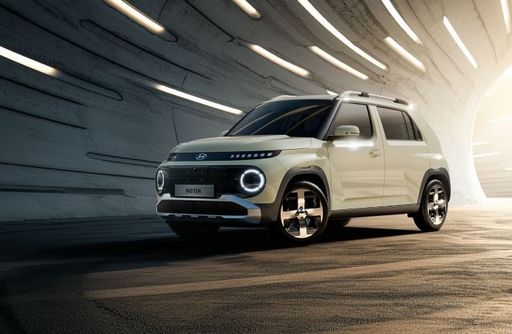
Hyundai Inster
Toyota Aygo
The Aygo is a cheeky city car that turns congested streets into a playground, with bold styling and sprightly manners that make parking a pleasure rather than a pain. Economical to run and surprisingly well equipped for its size, the Aygo is a smart choice for urban buyers who want personality without a premium price and a car that brings a smile to the daily commute.
details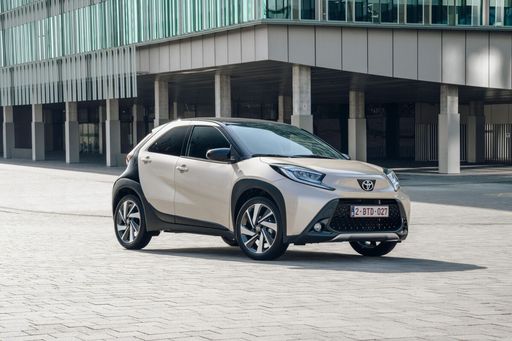
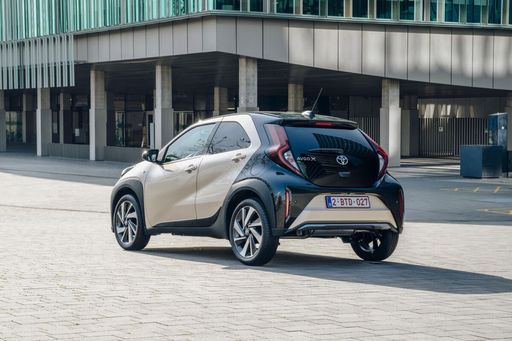
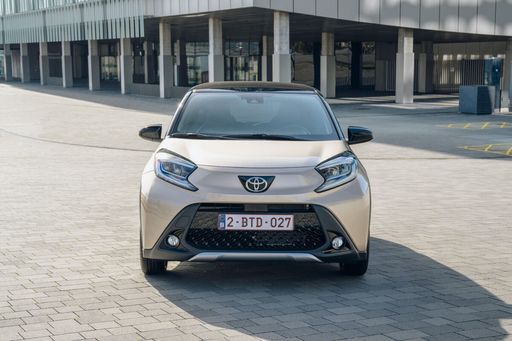
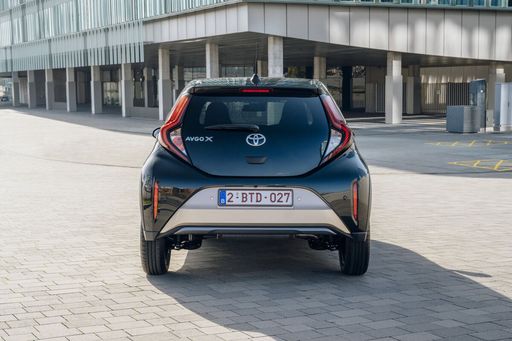
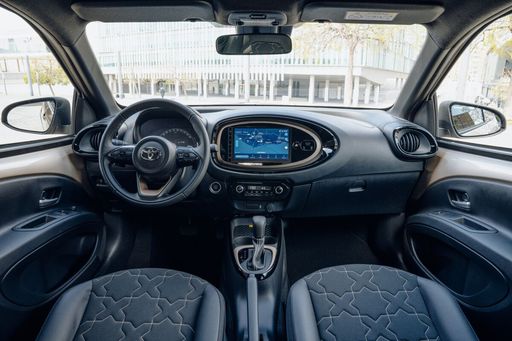
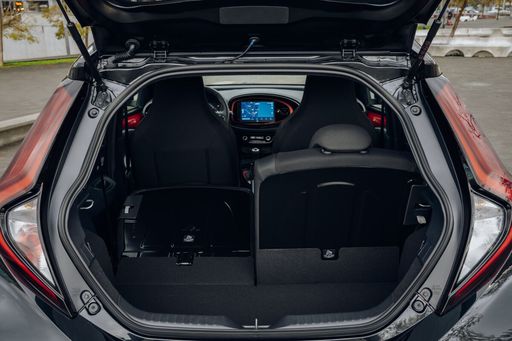
Hyundai Inster
The Inster has quickly captured the attention of automotive enthusiasts with its striking design and dynamic performance. This model seamlessly blends advanced technology with comfort, making it an ideal choice for both daily commutes and adventurous road trips. With its spacious interior and innovative features, the Inster promises an exhilarating driving experience that doesn’t compromise on practicality.
details
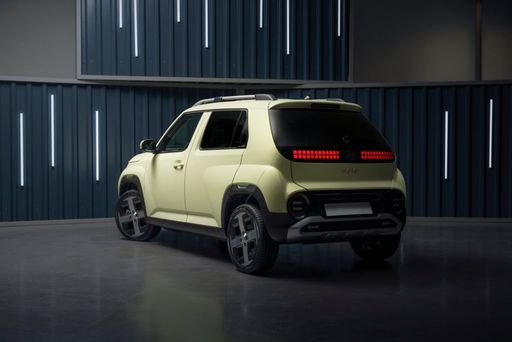
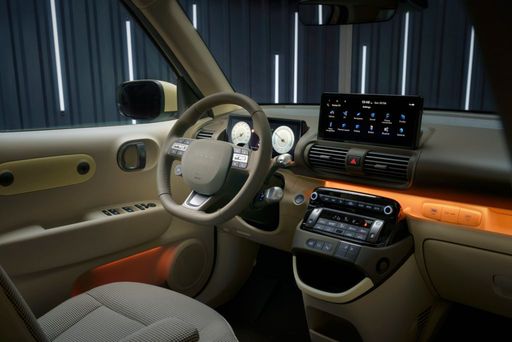
Costs and Consumption |
|
|---|---|
|
Price
15500 - 24300 £
|
Price
20500 - 25800 £
|
|
Consumption L/100km
3.7 - 4.9 L
|
Consumption L/100km
-
|
|
Consumption kWh/100km
-
|
Consumption kWh/100km
14.3 - 15.1 kWh
|
|
Electric Range
-
|
Electric Range
327 - 370 km
|
|
Battery Capacity
-
|
Battery Capacity
-
|
|
co2
85 - 111 g/km
|
co2
0 g/km
|
|
Fuel tank capacity
35 L
|
Fuel tank capacity
-
|
Dimensions and Body |
|
|---|---|
|
Body Type
SUV
|
Body Type
SUV
|
|
Seats
4
|
Seats
4
|
|
Doors
5
|
Doors
-
|
|
Curb weight
1015 - 1090 kg
|
Curb weight
1380 - 1433 kg
|
|
Trunk capacity
231 L
|
Trunk capacity
238 - 280 L
|
|
Length
3700 mm
|
Length
-
|
|
Width
1740 mm
|
Width
1610 mm
|
|
Height
1510 mm
|
Height
-
|
|
Max trunk capacity
829 L
|
Max trunk capacity
-
|
|
Payload
345 - 420 kg
|
Payload
317 - 357 kg
|
Engine and Performance |
|
|---|---|
|
Engine Type
Petrol, Full Hybrid
|
Engine Type
Electric
|
|
Transmission
Manuel, Automatic
|
Transmission
Automatic
|
|
Transmission Detail
Manual Gearbox, CVT
|
Transmission Detail
Reduction Gearbox
|
|
Drive Type
Front-Wheel Drive
|
Drive Type
Front-Wheel Drive
|
|
Power HP
72 - 116 HP
|
Power HP
97 - 115 HP
|
|
Acceleration 0-100km/h
9.2 - 15.6 s
|
Acceleration 0-100km/h
10.6 - 11.7 s
|
|
Max Speed
151 - 158 km/h
|
Max Speed
-
|
|
Torque
93 - 120 Nm
|
Torque
147 Nm
|
|
Number of Cylinders
3
|
Number of Cylinders
-
|
|
Power kW
53 - 85 kW
|
Power kW
71 - 85 kW
|
|
Engine capacity
998 - 1490 cm3
|
Engine capacity
-
|
General |
|
|---|---|
|
Model Year
2024 - 2025
|
Model Year
2025
|
|
CO2 Efficiency Class
C, B
|
CO2 Efficiency Class
A
|
|
Brand
Toyota
|
Brand
Hyundai
|
What drive types are available for the Toyota Aygo?
Available configurations include Front-Wheel Drive.
